
| Version | Summary | Created by | Modification | Content Size | Created at | Operation |
|---|---|---|---|---|---|---|
| 1 | Conner Chen | -- | 2633 | 2022-11-18 01:28:26 | | | |
| 2 | Conner Chen | Meta information modification | 2549 | 2022-11-22 01:21:10 | | |
Video Upload Options
1. Introduction
Jagadish "Jaggi" Vasudev[1] (born 3 September 1957), venerated as Sadhguru,[2][3] is an Indian yoga guru and author.[4][5][6][7]
Jaggi Vasudev earned a Bachelor's degree in English from the University of Mysore and has been teaching yoga in southern India since 1982. In 1992 he established the Isha Foundation near Coimbatore, which operates an ashram and yoga centre and is involved in various activities in spirituality, education and the environment.
Vasudev is the author of several books, including Inner Engineering: A Yogi's Guide to Joy (2016). He has addressed the United Nations ' Millennium World Peace Summit, the British parliament's House of Lords, the Massachusetts Institute of Technology, and the International Institute for Management Development. He has also spoken at the annual World Economic Forum in 2007, 2017 and 2020.
In 2017, he received the Padma Vibhushan, India's second-highest civilian award, from the Government of India for his contributions to social welfare.
2. Early Life
Jaggi Vasudev was born on 3 September 1957 in Mysore, Karnataka, India to a Telugu speaking family.[8] He had four siblings – two brothers and two sisters and was the youngest of them all. His mother Susheela Vasudev was a house maker and his father B.V. Vasudev[9] worked at the Mysuru Railway Hospital as a physician.[9] The family frequently moved due to the nature of his father's job.[9] He lived in Shimoga, Chikkaballapur, and Guntakal for a brief time and returned to Mysore with his family in 1969.[10][11]
Vasudev showed an inclination towards nature during his early life. He spent time trekking alone in forests as a child and developed an interest in snakes, often keeping them as pets.[12]
2.1. Education
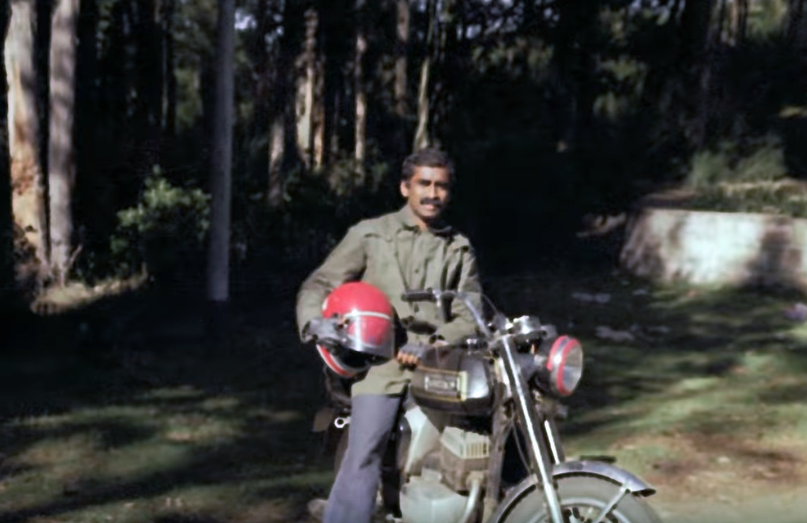
After his schooling at Demonstration School, Mysore and Mahajana Pre-University College, Vasudev graduated from the University of Mysore with a bachelor's degree in English, despite a spotty attendance record and an irreverent attitude to tuition.[13] Defying his parents’ wishes, he refused to pursue a post-graduate course and took to business instead.[14]
2.2. Spirituality
Aged thirteen, Vasudev took yoga lessons from Malladihalli Raghavendra, and kept practicing asanas and pranayama[15] daily throughout his youth, albeit without spiritual aspirations.[16] At the age of 25, on 23 September 1982, he went up Chamundi Hill and sat on a rock, where he had a 'spiritual experience'.[14] Six weeks afterwards, he left his business to his friend and travelled extensively in an effort to gain insight into his mystical experience.[14] After about a year of meditation and travel, he decided to teach yoga to share his inner experience.[14]
In 1983, he taught his first yoga class with seven participants in Mysore. Over time, he began conducting yoga classes across Karnataka and Hyderabad travelling on his motorcycle, subsisting on the produce of his poultry farm rental and donating the collections received from his students to a local charity on the last day of the class.[14]
2.3. Family
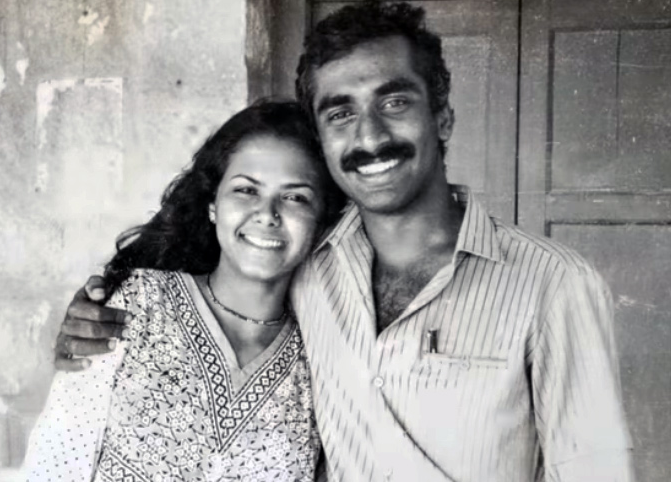
Jaggi Vasudev's family’s lineage is linked on his mother’s side, to Krishnadevaraya of the Vijayanagara Empire.[17] His paternal great-grandmother, Kuntamma, impacted him as a child. Called Kuntamma or one who limps, she built a temple, but was considered unorthodox by society’s standards, because of her loud laugh and lack of respect for social conventions, especially in worship and religion. Vasudev has fondly recalled how her bedtime stories kept him engaged, and how her exuberant style of worship intrigued him.[17] Kuntamma’s son and Vasudev’s grandfather was a wealthy man with a large ancestral home. It was at his grandfather’s house that Vasudev first came in touch with Malladihalli Raghavendra, from whom he learnt yoga.[17]
He met Vijaya Kumari, known as Vijji, in 1984 after a yoga class in Mysuru. Vijaya Kumari had previously been through a difficult marriage and divorce.[18] After a brief romance, they made an impromptu decision to get married during a trip to Irupu Falls on Maha Shivaratri. Kumari and Vasudev’s mother developed a close relationship, while Kumari’s parents respected Vasudev because her father benefited from Vasudev’s yoga classes after suffering a paralytic stroke.[19]
Vasudev’s mother died in 1989 of renal failure.[20] In 1990, Vasudev and Kumari had a daughter, Radhe Jaggi.[21] On 22 January 1997, Kumari died at a large gathering at the Isha Yoga Center.[22] After a complaint alleging foul play was filed eight months later, an inquiry was conducted.[23]
Vasudev and Kumari's daughter Radhe Jaggi, born 1990,[24] is a trained bharatanatyam dancer.[25] She married Chennai-based classical vocalist Sandeep Narayan in 2014.[26]
2.4. Business and Travels
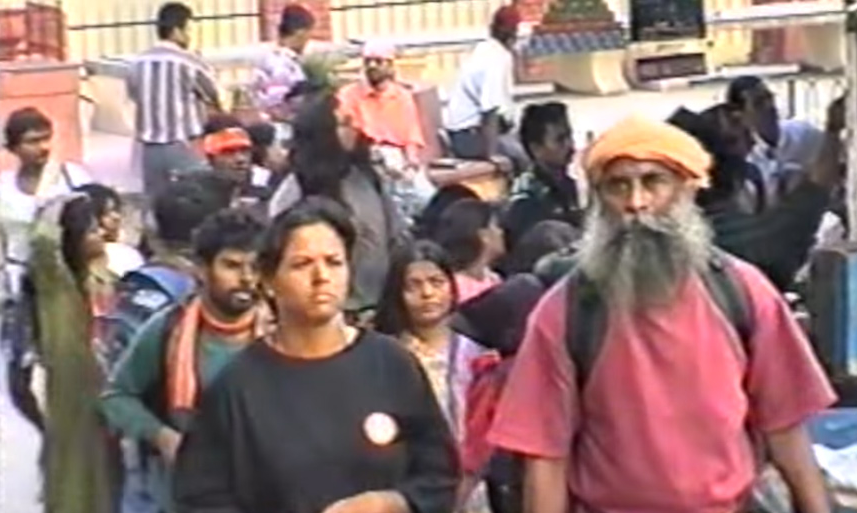
According to Vasudev, his main motive in getting into business was to fund his urge to travel and explore.[27] One of his favorite haunts was the Chamundi Hills,[28] where he often rode at night. On one occasion, in pursuit of adventure, he decided to go off-road and rode down the slope of the hill, careening into trees and rocks and suffering a broken ring finger.[29] He also formulated a plan with his motorcycling friends to build a commune in a hundred acres of land, where they would live without any rules or regulations. The idea never came through, and Vasudev admits that it was for the best that he never executed the plan.[30] Besides riding his motorcycle in and around Mysore, he also rode across India, before being stopped at the border because he had no passport.[31]
His first business was a poultry farm in a remote part of Mysore.[32] He chose poultry because the sector was on the rise in the region at the time. He set up his farm with borrowed money.[28] Due to financial constraints, Vasudev chose to construct the farm buildings and bird cages by himself over six months. In the process of constructing his farm, he also took to brickmaking, and soon converted this into a second business. [17] Though his family did not approve of his choice of business and thought it was a waste of time,[28] the farm soon turned profitable. Operating his businesses occupied four hours of his time every day. The rest of his time was spent writing poetry, reading, swimming and relaxing. Vasudev says that though he was practicing asanas and pranayama from the age of thirteen, it was during his time at the poultry farm that he began to meditate in an established way.[33]
His third business was a construction company named Buildaids. Vasudev entered the construction industry as a response to the constant questions from his relatives about why he was into the poultry business. He started the company in partnership with a friend who was a qualified civil engineer. Though Vasudev had no formal engineering training, he used the experience gained from building his poultry farm in his new company.[28]
2.5. Books and Public Engagement
Jaggi Vasudev is the author of several books. His books Inner Engineering: A Yogi's Guide to Joy[33] and Karma: A Yogi's Guide to Crafting Your Destiny made The New York Times Best Seller list.[34][35][36][37] Vasudev is also the author of Mystic's Musings[38] and Death: An Inside Story.[39][40]
Vasudev is a frequent public speaker who has been invited to address many prestigious forums and conferences across the globe, such as the United Nation's Millennium World Peace Summit, the House of Lords, the Massachusetts Institute of Technology, and the International Institute for Management Development.[41] He has also spoken at the annual World Economic Forum in 2007,[42] 2017 and 2020.[43][44]
2.6. Honours
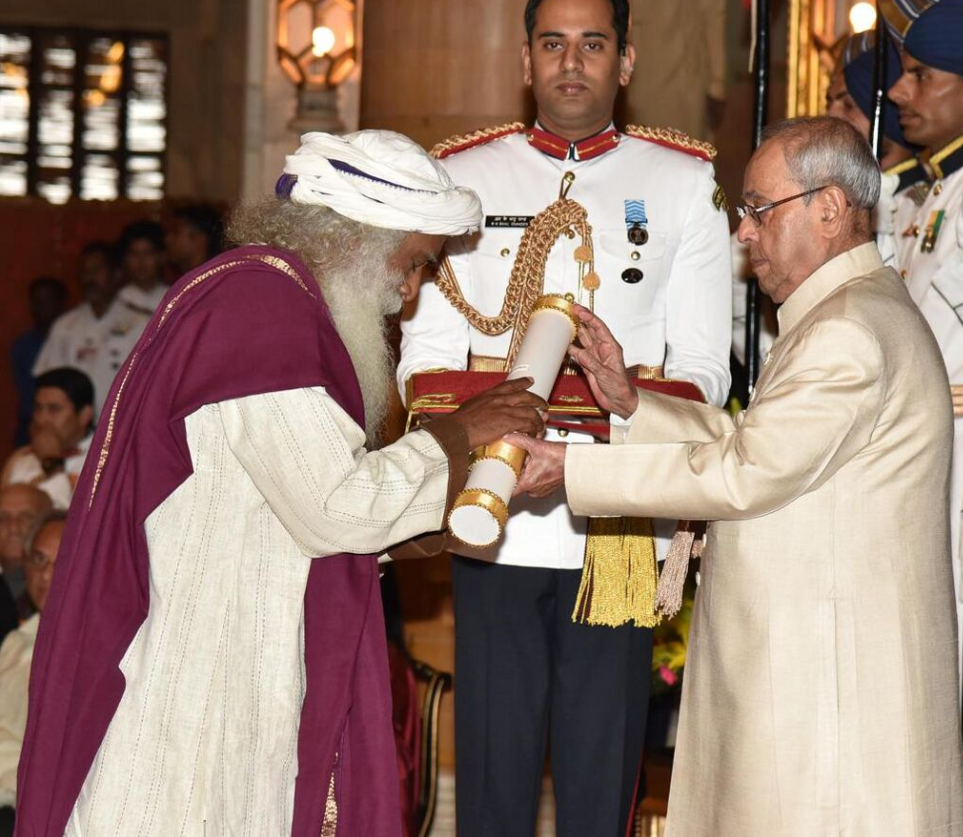
Vasudev received the Padma Vibhushan, the second-highest civilian award from the Government of India in 2017 in recognition of his contribution to the field of spirituality.[45][46] He stood 92nd in The Indian Express' list of 100 most powerful Indians, in 2012 and stood 40th in India Today's list of 50 most powerful Indians, in 2019.[47][48]
3. Isha Foundation
Located on the foothills of the Velliangiri Mountains, forty kilometres from the city of Coimbatore in the state of Tamil Nadu, South India,[49] Isha Foundation was established as a non-profit organisation by Vasudev in 1992.[5] Its social initiatives have been awarded with the Rashtriya Khel Protsahan Puraskar.[50]
3.1. Yoga Programmes
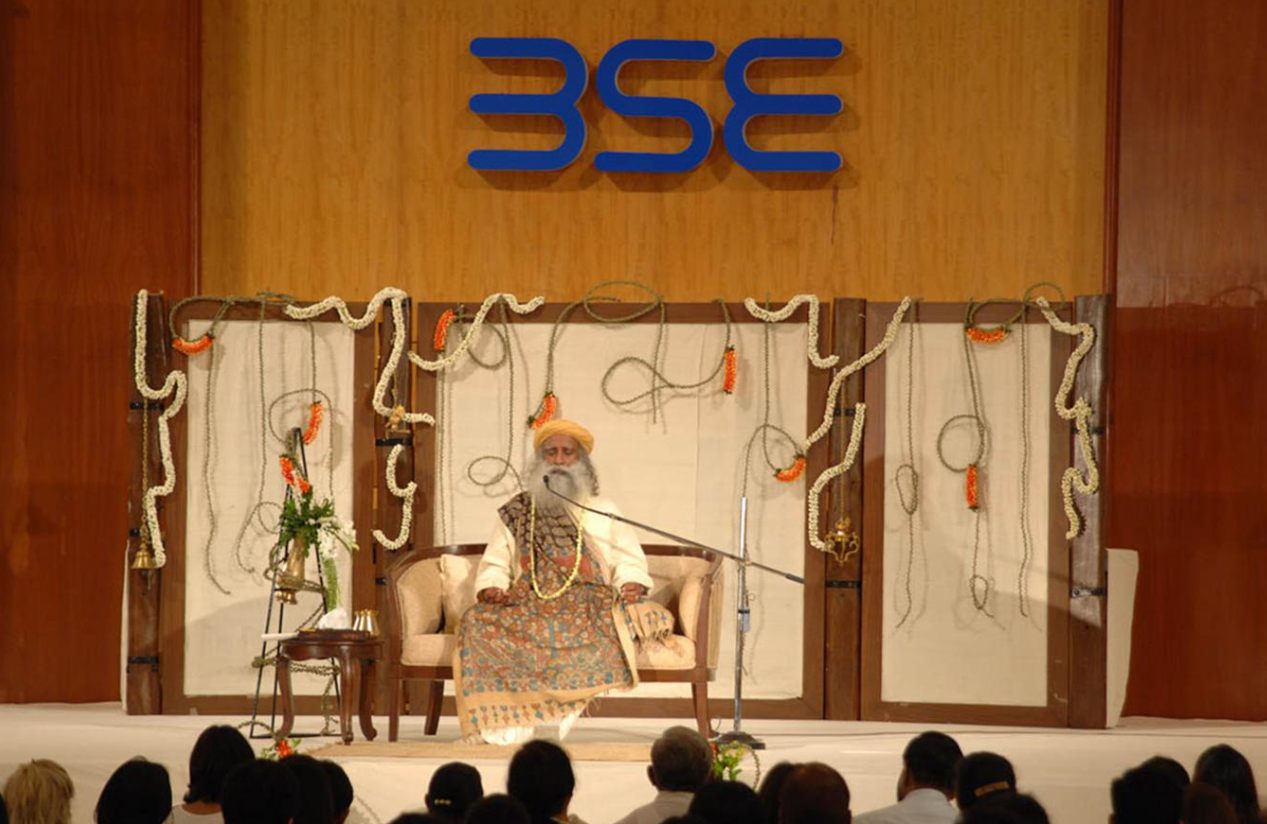
After the establishment of the ashram, Vasudev began conducting yoga programmes on the premises of the newly established Isha Yoga Centre in 1994, including a course for the Indian Hockey team in 1996.[51][52] In 1997, he began conducting classes in the United States[53][54] and from 1998 onwards, for life-term prisoners in Tamil Nadu prisons.[55][56]
The flagship program is titled 'Inner Engineering', which introduces people to simple Yoga practices and the Shambhavi Mahamudra;[57] corporate leadership forms a core audience of these programs.[58] It views depression as the result of a false widespread belief about an ability to change the world according to one's desires, and offers to teach the technology of mental well-being, to help one acclimatise with unavoidable work rigors.[59] Vasudev has frequently cited a study by the University of California which supposedly found mahamudra to lead to highly elevated levels (221%) of neuronal regeneration in the brain; it has since been noted that the study appeared in a fringe journal published by a discredited alternative medicine advocate and his allies, and that it merely reports lower levels of subjective stress from a medium-sized uncontrolled group practising yoga daily for six weeks.[60]
3.2. The Dhyanalinga
The Dhyanalinga (composed of the terms dhyāna and linga) is a consecrated sculptural stone structure standing 4.3 metres (13 feet 9 inches) tall.[61] Its creation and consecration, according to Vasudev, was his life's mission entrusted to him by his guru, Palani Swami.[14] In 1998, the structure of the Dhyanalinga was ordered and arrived at the ashram, where the Dhyanalinga Yogic Temple was being built to hold it.[62] After three years of work, the temple was completed on 23 June 1999[63] and opened to the public on 23 November.[64]
The Dhyanalinga Yogic Temple is a meditative space which is not dedicated to any particular faith or belief system,[65] and is open to all visitors irrespective of their religion or nationality.[66] A stone pillar named the Sarva Dharma stambha, located at the temple's front entrance, features symbols of several religions to indicate the venue's universality.[67][68]
3.3. Adiyogi Shiva Statue
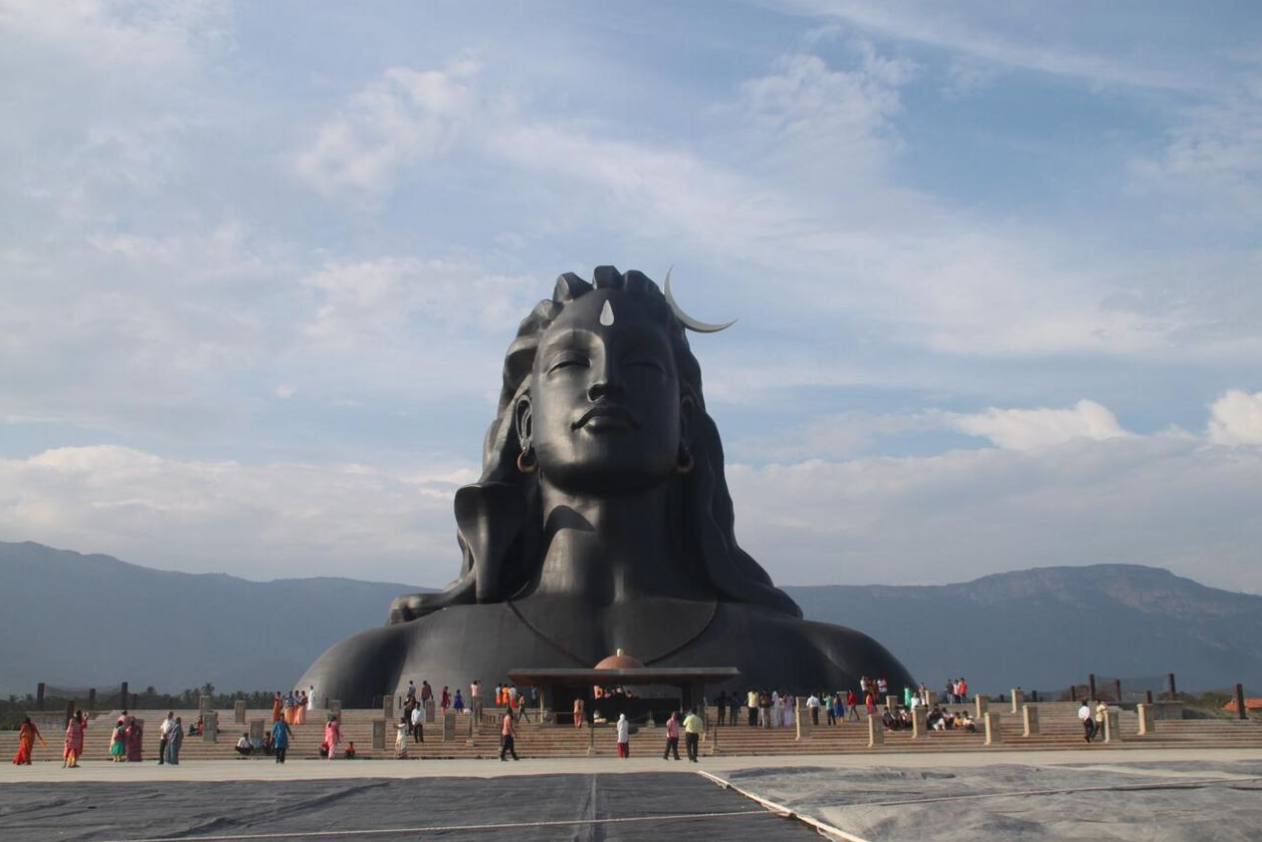
Designed by Jaggi Vasudev, the foundation built a 34-metre-tall (112 ft) and 500-tonne (490-long-ton; 550-short-ton) Shiva statue for inspiring and promoting yoga. It was inaugurated by the Prime Minister of India, Narendra Modi[69] and has been since recognised as the "Largest Bust Sculpture" by Guinness World Records.[70] It is a part of the Incredible India campaign.[71]
The Tamil Nadu government has since claimed the entire construction as illegal, for which no approval was granted;[72] Comptroller and Auditor General's report further states the construction to have flagrantly violated the rules of biodiversity zones.[73][74][75]
3.4. Events
Jaggi Vasudev regularly conducts gatherings (mahasathsangs) in the Indian states of Tamil Nadu and Karnataka.[76] He also takes spiritual aspirants on annual pilgrimages (yatras) to Mount Kailash and the Himalayas.[77][78]
Every year at the Isha Yoga Centre, Vasudev celebrates an all-night Mahashivarathri, the annual Hindu festival in honour of Shiva. It is estimated that these celebrations were attended by as many as 800,000 people in 2013.[79][80][81] He has also established a Linga Bhairavi temple in Coimbatore where women conduct the rituals.[82]
Isha Vidhya, an education initiative, aims to raise the level of education and literacy in rural India by providing quality English-language-based, computer-aided education. There are seven Isha Vidhya Schools in operation which educate around 3,000 students.[83]
The foundation also runs an Action for Rural Rejuvenation program, in over 4200 villages, raising the welfare of the underprivileged.
3.6. Environmental Initiatives
Isha Foundation has consultative status with the UN Economic and Social Council,[84] and is an accredited observer of the UN Convention to Combat Desertification.[85] Narendra Modi, Prime Minister of India, praised the efforts by foundation for carrying forward Swachh Bharat Mission in Tamil Nadu.[86]
3.7. Project GreenHands
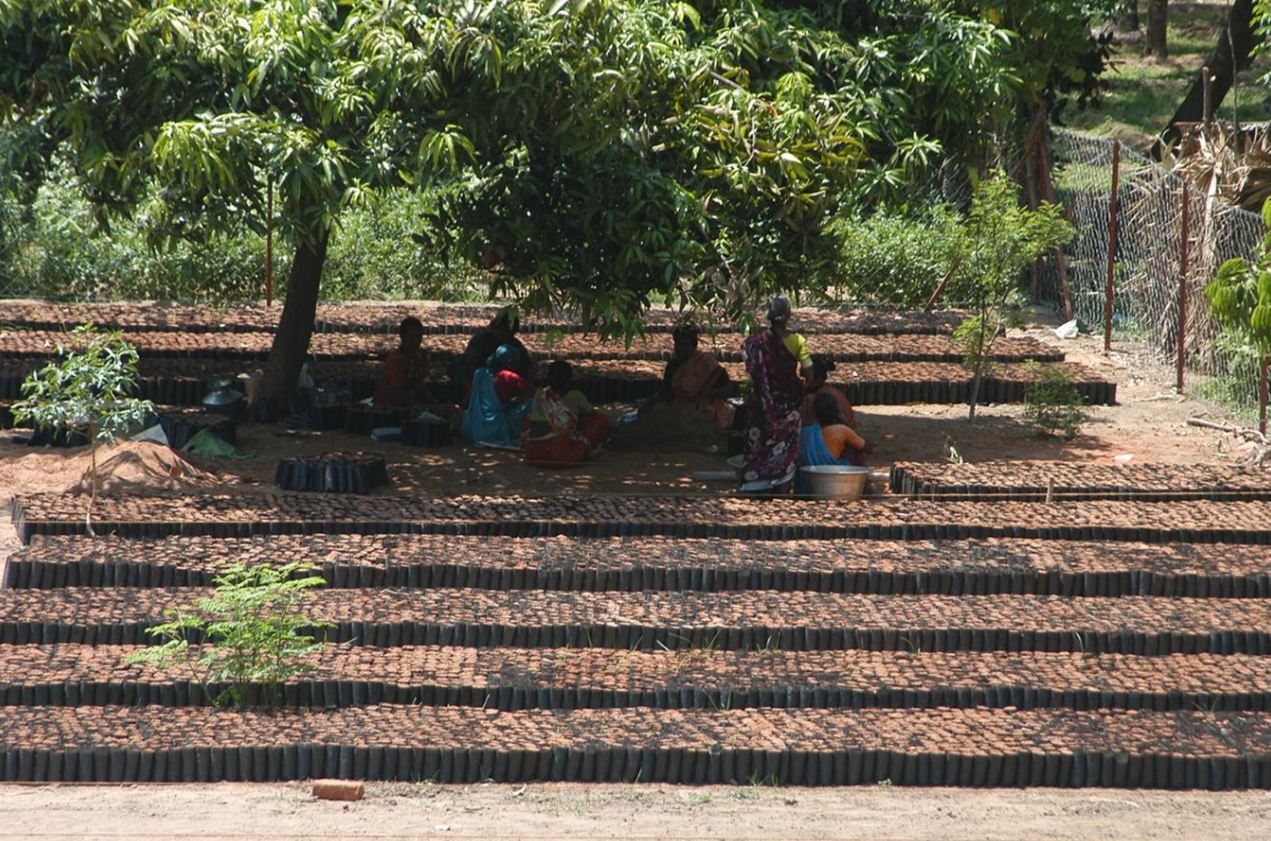
Project GreenHands (PGH) was established in 2004 as an environmental organisation. Its activity is largely focused on Tamil Nadu. The organisation received the Indira Gandhi Paryavaran Puraskar, the Government of India's environmental award in 2010.[87] The organisation's activities include agroforestry, plant nurseries in schools,[88] and tree-planting in urban centres such as Tiruchirappalli[89] and Tiruppur.[90]
3.8. Rally for Rivers
The Rally for Rivers campaign, which ran from September to October 2017,[91] intended to rejuvenate India's depleting rivers by growing large forests along their banks. Promoted by Vasudev all over the country, the campaign received support from a broad range of celebrities and the urban populace.[92] MOUs were signed with state governments.
However, the campaign has been widely criticised by environmentalists for lacking in scientific basis and shifting the spotlight away from real concerns.[93] Acclaimed water conservationist Rajendra Singh alleges that the campaign is motivated by the goal of money and fame.[94]
3.9. Cauvery Calling
The Cauvery Calling project aims to support farmers in planting an estimated 2.4 billion trees through agroforestry, thereby covering one third of Cauvery basin with trees, as a means of conserving it. The project has received acclaim from politicians and members of the movie industry.
However, environmentalists and public intellectuals allege that the program presents a simplistic view of river conservation, sidesteps social issues, and has the potential to harm tributaries and wildlife habitats.[95][96][97] A Public Interest litigation has also been filed in the Karnataka High Court questioning the legality of the fundraising practices for the initiative, and the usage of government owned land for a private purpose without supporting study.[98][99][100][101] In January 2020, the High Court ruled that the Foundation needed to disclose details of its fundraising practices relating to the initiative.[102]
4. Criticism
Critics claim that Jaggi Vasudev shares the ideology of Bharatiya Janata Party's Hindu nationalism (Hindutva),[103][104][105][106] and that he takes an "intolerant nationalist" stance in his media appearances.[103] He advocates a total ban on cow slaughter and characterises the era of Muslim Rule in India as an "oppressive occupation" that was far worse than the British Raj. Vasudev has also spoken in favour of the 2019 Balakot airstrike, the introduction of a comprehensive GST, and the Citizenship (Amendment) Act, 2019, while denouncing the Thoothukudi protests as a peril to industry.[107][108][109] Vasudev accuses leftist liberals of aiding and abetting militancy in Kashmir, and has suggested that Kanhaiya Kumar and Umar Khalid, known for their involvement in the JNU sedition row, should be put behind bars.[110] His understanding of politics and history has been repeatedly questioned.[103][108]
Vasudev has also been accused of promoting pseudoscience and misrepresenting science.[111][112][113] He propagates the claim, unsupported by science, that cooked food consumed during lunar eclipses depletes the human body's pranic energies.[114] He also perpetuates numerous myths regarding clinical depression, and opposes the potential prohibition on the use of mercury in traditional Indian medicine, despite the substance's extreme toxicity.[115][116] His views on the Higgs boson and alleged benefits of vibhuti have been rejected as unproven by science.[117][118]
References
- "How Jagadish Vasudev Became Sadhguru | TED Talk 2009" (in en). 2021-05-28. https://isha.sadhguru.org/in/en/wisdom/audio/how-jagadish-vasudev-became-sadhguru.
- Waghorne 2013, p. 297; Foreword by Pat MacEnulty in Simone & Vasudev 2008, p. 10
- Sadhguru, alternatively spelled sadguru,[4] means "real or true guru".[5] The term has also been translated as "senior sadhu; eminent preceptor".[6]
- IANS (2016-10-09). "Don't vote as part of a tribe, Jaggi Vasudev tells Americans". Business Standard India. http://www.business-standard.com/article/news-ians/don-t-vote-as-part-of-a-tribe-sadhguru-jaggi-vasudev-tells-americans-116101600189_1.html.
- "The most powerful Indians in 2009: 80–84". The Indian Express. 9 March 2009. http://www.indianexpress.com/news/the-most-powerful-indians-in-2009-8084/432810/.
- Rao, Mallika (2018-04-04). "Why I Hate Gurus" (in en-us). Vox Media. https://www.vulture.com/2018/04/why-i-hate-gurus.html.
- Chetan, Mahesh (5 March 2017). "10 Most Inspiring Yoga Gurus of India". Indian Yoga Association. https://www.indianyogaassociation.com/blog/yoga-gurus-in-india.html.
- Subramaniam 2013, p. 30, 31.
- "Jaggi Vasudev’s father passes away" (in en-US). 2019-11-09. https://starofmysore.com/jaggi-vasudevs-father-passes-away/.
- Subramaniam 2013, p. 32.
- "India: the engineering of Sadhguru's Isha". https://english.religion.info/2008/12/28/india-the-engineering-of-sadhgurus-isha/.
- Aug 18, Mohua Das / TNN / Updated; 2017; Ist, 09:56. "Sadhguru to journey down rivers, find ways for revival | India News - Times of India" (in en). https://timesofindia.indiatimes.com/india/sadhguru-to-journey-down-rivers-find-ways-for-revival/articleshow/60113561.cms.
- Subramaniam 2013, p. 71.
- Simone, Cheryl (2008). Midnights with the Mystic. Hampton Roads Publishing Company. ISBN 978-1-57174-561-3. https://books.google.com/books?id=Q5yjIrrK8E4C.
- Subramaniam 2013, p. 73.
- Subramaniam 2013, pp. 38–39.
- Subramaniam, Arundhathi (2010). Sadhguru, More Than a Life. Penguin Books India. pp. 72.
- Subramaniam, Arundhathi (2010). Sadhguru, More Than a Life. Penguin Books India. pp. 89. ISBN 978-8184753110.
- Subramaniam, Arundhathi (2010). Sadhguru, More Than a Life. Penguin Books India. pp. 90-93. ISBN 978-8184753110.
- Subramaniam, Arundhathi (2010). Sadhguru, More Than a Life. Penguin Books India. pp. 215. ISBN 978-8184753110.
- Subramaniam, Arundhathi (2019). Sadhguru, More Than a Life. Penguin Books India. pp. 105. ISBN 978-8184753110.
- Subramaniam, Arundhathi (2010). Sadhguru, More Than a Life. Penguin Books India. pp. 173. ISBN 978-8184753110.
- Subramaniam, Arundhathi (2010). Sadhguru, More Than a Life. Penguin Books India. pp. 173. ISBN 978-8184753110.
- Subramaniam 2013, p. 105.
- Naidu, Jaywant (2017-11-26). "When beauty comes to life". Deccan Chronicle. https://www.deccanchronicle.com/entertainment/theatre/261117/when-beauty-comes-to-life.html.
- Sangeetha, P (2014-10-24). "Sadhguru's daughter gets married in Kovai". The Times of India. https://timesofindia.indiatimes.com/city/coimbatore/Sadhgurus-daughter-gets-married-in-Kovai/articleshow/44924821.cms.
- Subramaniam 2013, p. 72.
- Chopra, Shaili (2014). When I Was 25: The Leaders Look Back. Random House Publishers India Pvt. Limited. ISBN 9788184006773.
- Subramaniam 2013, p. 74-75.
- Subramaniam 2013, p. 75.
- Dobhal, Shailesh (March 18, 2015). "Lunch with BS: Sadhguru Jaggi Vasudev". https://www.business-standard.com/article/opinion/lunch-with-bs-sadhguru-jaggi-vasudev-114121201397_1.html.
- An, Shelly; December 27, New Delhi; January 4, 2020 ISSUE DATE; December 28, 2021UPDATED; Ist, 2020 16:14. "Suddenly, I did not know what was me and what was not me: Sadhguru" (in en). https://www.indiatoday.in/magazine/anniversary/story/20210104-suddenly-i-did-not-know-what-was-me-and-what-was-not-me-1753026-2020-12-27.
- "Don't vote as part of a tribe, Jaggi Vasudev tells Americans". Business Standard (IANS). 16 October 2016. http://www.business-standard.com/article/news-ians/don-t-vote-as-part-of-a-tribe-sadhguru-jaggi-vasudev-tells-americans-116101600189_1.html.
- "Health". The New York Times. https://www.nytimes.com/books/best-sellers/2016/10/09/health/.
- "Religion, Spirituality and Faith". The New York Times. https://www.nytimes.com/books/best-sellers/2016/10/09/religion-spirituality-and-faith/.
- "New York Times Bestsellers - Advice, How-To & Miscellaneous: New this week INNER ENGINEERING". The New York Times. 2016-10-09. https://www.nytimes.com/books/best-sellers/2016/10/09/advice-how-to-and-miscellaneous.
- "Books - Best Sellers: Advice, How-To & Miscellaneous". The New York Times (New York). 2021-05-16. ISSN 0362-4331. https://www.nytimes.com/books/best-sellers/2021/05/16/advice-how-to-and-miscellaneous/. Retrieved 2021-08-07.
- "Tantra between the covers" (in en-IN). The Hindu. 2005-07-15. ISSN 0971-751X. https://www.thehindu.com/todays-paper/tp-features/tp-fridayreview/tantra-between-the-covers/article28584632.ece.
- "Spiritual leader Sadhguru's new book to demystify death". https://www.outlookindia.com/newsscroll/spiritual-leader-sadhgurus-new-book-to-demystify-death/1699568.
- "Maha Shivratri 2020: VP Venkaiah Naidu joins Sadhguru in celebrations at Isha Foundation" (in en). https://www.freepressjournal.in/india/maha-shivratri-2020-vp-venkaiah-naidu-joins-sadhguru-in-celebrations-at-isha-foundation.
- Hudson & Hudson 2017, p. 2
- Chandrasekhar, Anand. "Indian gurus and their Swiss watches: a history" (in en). SWI swissinfo.ch. https://www.swissinfo.ch/eng/clockwork-orange_indian-gurus-and-their-swiss-watches--a-history/44868044.
- "Sadhguru to Deliver Keynote, Conduct Meditation Session at Davos Summit". 20 January 2020. https://www.news18.com/news/india/sadhguru-to-deliver-keynote-conduct-meditation-session-at-davos-summit-2465795.html.
- "Golf with the Guru" (in en-IN). The Hindu. 2009-03-15. ISSN 0971-751X. https://www.thehindu.com/todays-paper/tp-features/tp-sundaymagazine/Golf-with-the-Guru/article15941259.ece.
- "Jaggi Vasudev, Mariyappan among Padma award winners". The Hindu. 26 January 2017. http://www.thehindu.com/todays-paper/tp-national/tp-tamilnadu/Sadhguru-Jaggi-Vasudev-Mariyappan-among-Padma-award-winners/article17095664.ece.
- "Padma Vibhushan award for Sharad Pawar and Jaggi Vasudev" (in en). 26 January 2017. https://www.deccanchronicle.com/nation/current-affairs/260117/sharad-pawar-sadhguru-jaggi-vasudev-awarded-with-padma-vibhushan.html.
- "The most powerful Indians in 2012: No. 91-100 - Indian Express". http://archive.indianexpress.com/news/the-most-powerful-indians-in-2012-no.-91100/916140/1.
- "Top 50 power people | The High & Mighty Part-4" (in en). 26 July 2019. https://www.indiatoday.in/magazine/cover-story/story/20190805-top-50-power-people-the-high-mighty-part-4-1573244-2019-07-26.
- Berghella 2018, p. 69
- "Rashtriya Khel Protsahan Puraskar for Isha Outreach". https://www.newindianexpress.com/cities/chennai/2018/sep/26/rashtriya-khel-protsahan-puraskar-for-isha-outreach-1877222.html.
- "Morale-Booster says Bhaskaran". The Indian Express. 26 November 1996. https://www.ishafoundation.org/component/option,com_newscomponent/Itemid,885/act,view/id,687/.
- "Refreshed Team Begins Final Preparation". The Hindu. 2 December 1996. https://www.ishafoundation.org/component/option,com_newscomponent/Itemid,885/act,view/id,688/.
- Hamburg, Jay (15 October 1997). "Yoga guru touts peace, not religion". The Tennessean: pp. 1B–2B. https://www.ishafoundation.org/news/newsclips/nashville1.pdf.
- "It doesn't take a guru to know which way the stress flows". Dayton Daily News. 17 March 1998.
- "Yoga Brings 'Freedom' to Prisoners". The Hindu. 16 February 1998.
- Mark Singleton; Ellen Goldberg (6 November 2013). Gurus of Modern Yoga. Oxford University Press. pp. 283–295. ISBN 978-0-19-993871-1. https://books.google.com/books?id=walBCgAAQBAJ&pg=PP1.
- "In pursuit of peace of mind". Daily News and Analysis. 20 January 2011. http://www.dnaindia.com/lifestyle/report_in-pursuit-of-peace-of-mind_1496488.
- "The route to 'dharmacracy'". Business Today. 27 November 2008. http://businesstoday.intoday.in/bt/story/3428/1/the-route-to-dharmacracy.html.
- Kapur, Jyotsna (2013). "For Some Dreams a Lifetime is Not Enough: The Rasa Aesthetic and the Everyday in Neoliberalism". The Politics of Time and Youth in Brand India: Bargaining with Capital. Anthem Press. pp. 89. ISBN 978-0-85728-109-8. https://www.cambridge.org/core/books/politics-of-time-and-youth-in-brand-india/for-some-dreams-a-lifetime-is-not-enough-the-rasa-aesthetic-and-the-everyday-in-neoliberalism/6CFBCD9273C38DD9D79AE0314E90C71F.
- Peterson, Christine Tara; Bauer, Sarah M.; Chopra, Deepak; Mills, Paul J.; Maturi, Raj K. (22 September 2017). "Effects of Shambhavi Mahamudra Kriya , a Multicomponent Breath-Based Yogic Practice ( Pranayama ), on Perceived Stress and General Well-Being" (in en). Journal of Evidence-Based Complementary & Alternative Medicine 22 (4): 788–797. doi:10.1177/2156587217730934. ISSN 2156-5872. PMID 29228793. http://www.pubmedcentral.nih.gov/articlerender.fcgi?tool=pmcentrez&artid=5871312
- Berghella 2018, p. 74
- Berghella 2018, p. 70
- "Dhyanalingam installed". The Indian Express. 26 July 1999.
- "A multi religious temple". The Hindu. 19 November 1999.
- Rangaswamy, Sudhakshina (25 July 2003). "Transformation of the inner Self". The Hindu. http://www.hindu.com/fr/2003/07/25/stories/2003072501630600.htm.
- Berghella 2018, p. 72
- Ganapathy, T.K. (28 September 2001). "Haven for the spiritually inclined". The Hindu. http://www.hinduonnet.com/2001/09/28/stories/13280795.htm.
- "Haven for the Spiritually Inclined - The Hindu - 28 September, 2001 - Isha Foundation". Isha Foundation. http://beta.ishafoundation.org/component/option,com_newscomponent/Itemid,288/act,view/id,670/lang,hi/.
- "PM Narendra Modi unveils first 112-foot tall Shiva statue in Coimbatore". The Financial Express. 24 February 2017. http://www.financialexpress.com/india-news/pm-narendra-modi-to-unveil-first-112-foot-tall-shiva-statue-in-coimbatore-on-mahashivratri-5-interesting-facts-to-know/563295/.
- "Largest bust (sculpture)". http://www.guinnessworldrecords.com/world-records/458751-largest-bust-sculpture.
- Team, DNA Web (2017-02-24). "Maha Shivratri 2017: PM Modi unveils 112-foot Shiva statue in Coimbatore" (in en). https://www.dnaindia.com/india/report-maha-shivratri-2017-pm-modi-unveils-112-foot-statue-in-coimbatore-hails-health-benefits-of-yoga-2333914.
- "Isha's Shiva statue has no approval, buildings illegal: TN government takes a stand". The News Minute. 1 March 2017. http://www.thenewsminute.com/article/ishas-shiva-statue-has-no-approval-buildings-illegal-tn-government-takes-stand-57938.
- "CAG pulls up Tamil Nadu forest department over unapproved construction by Isha Foundation in protected zone". 11 July 2018. https://www.firstpost.com/india/cag-pulls-up-tamil-nadu-forest-department-over-unapproved-construction-by-isha-foundation-in-protected-zone-4718781.html.
- Kumar, B. Aravind (2018-07-12). "Isha Foundation flouted norms: CAG" (in en-IN). The Hindu. ISSN 0971-751X. https://www.thehindu.com/news/national/tamil-nadu/isha-foundation-flouted-norms-cag/article24393672.ece.
- "But Why Is the Cauvery Calling?". https://thewire.in/environment/isha-foundation-jaggi-illegal-yoga-centre.
- "Isha's Green Salem goes on stream". The Hindu. 14 December 2010. http://www.hindu.com/2010/12/14/stories/2010121450650300.htm.
- "Isha shows the way". The Indian Express. 29 June 2009. http://newindianexpress.com/nation/article113158.ece.
- "Mansarovar is beyond words". Daily News and Analysis. 1 September 2010. http://www.dnaindia.com/lifestyle/report_mansarovar-is-beyond-words_1431882.
- Zakaria, Namrata (June 2013). "The Lure of Isha". Harpers Bazaar: pp. 106–108. http://www.ishafoundation.org/news/newsclips/2013/Bazaar-15-June-2013.pdf.
- Zakaria, Namrata (14 March 2013). "Fashion label to 'yogi': Donna Karan on an Indian holiday". The Indian Express. http://www.indianexpress.com/news/fashion-label-to-yogi-donna-karan-on-an-indian-holiday/1087745/.
- Vyas, Sheetal (1 April 2013). "Holy Days". Outlook. http://travel.outlookindia.com/article.aspx?284848.
- "Ma Linga Bhairavi temple in Coimbatore allows only women to perform pooja even during menstruation". https://www.newindianexpress.com/states/tamil-nadu/2020/feb/23/ma-linga-bhairavi-temple-in-coimbatore-allows-only-women-to-perform-pooja-even-during-menstruation-2107376.html.
- "LIC gives grant to Isha". The Hindu. 7 April 2010. http://hindu.com/2010/04/07/stories/2010040751230200.htm.
- United Nations Economic and Social Council (1 September 2010). "List of non-governmental organizations in consultative status with the Economic and Social Council as of 1 September 2010". https://esango.un.org/paperless/reports/E2010INF4.pdf.
- "Isha Foundation | Knowledge Hub". https://knowledge.unccd.int/cso/isha-foundation.
- "PM praises Sadhguru for carrying forward Swachh Bharat in TN". Business Standard India. Press Trust of India. 2018-09-15. https://www.business-standard.com/article/pti-stories/pm-praises-sadhguru-for-carrying-forward-swachh-bharat-in-tn-118091500572_1.html.
- Award for Project Green Hands , The Hindu, 8 June 2010, retrieved on 8 June 2010 http://www.hindu.com/2010/06/08/stories/2010060850280200.htm
- "Isha's Green School Movement kicks-off in Kanchi dist". The New Indian Express. http://www.newindianexpress.com/cities/chennai/2018/feb/07/ishas-green-school-movement-kicks-off-in-kanchi-dist-1769618.html.
- Staff Reporter (2010-10-04). "Green Tiruchi Movement seeks to rectify ailing environment" (in en-IN). The Hindu. ISSN 0971-751X. https://www.thehindu.com/news/cities/Tiruchirapalli/Green-Tiruchi-Movement-seeks-to-rectify-ailing-environment/article15768688.ece.
- "Stalin inaugurates Green Tirupur Movement" (in en-IN). The Hindu. 2009-08-25. ISSN 0971-751X. https://www.thehindu.com/todays-paper/tp-national/tp-tamilnadu/Stalin-inaugurates-Green-Tirupur-Movement/article16539707.ece.
- Thirumurthy, Priyanka (2017-09-06). "'Why tree planting is not the answer': Experts question Jaggi Vasudev's 'shallow' Rally for Rivers". The News Minute. https://www.thenewsminute.com/article/why-tree-planting-not-answer-experts-question-jaggi-s-rally-rivers-68004.
- "Rally for Rivers: Isha Foundation's campaign has good intentions but minimal scientific backing". https://www.firstpost.com/india/rally-for-rivers-isha-foundations-campaign-has-good-intentions-but-minimal-scientific-backing-4022799.html.
- Sources criticizing the program:- "Rally for Rivers: Isha Foundation's campaign has good intentions but minimal scientific backing". https://www.firstpost.com/india/rally-for-rivers-isha-foundations-campaign-has-good-intentions-but-minimal-scientific-backing-4022799.html. "Jaggi Vasudev's 'Rally for Rivers' Will Worsen the Problem It Plans to Tackle". https://thewire.in/environment/rally-for-rivers-jaggi-vasudev-trees-narmada-adani-sand-mining. Harsha, J.. "Forests won't do the trick for rivers" (in en). https://www.thehindubusinessline.com/opinion/forests-wont-do-the-trick-for-rivers/article22417854.ece. Thirumurthy, Priyanka (2017-09-06). "'Why tree planting is not the answer': Experts question Jaggi's 'shallow' Rally for Rivers". The News Minute. https://www.thenewsminute.com/article/why-tree-planting-not-answer-experts-question-jaggi-s-rally-rivers-68004. "The Empty Environmentalism of 'Rally for Rivers'". https://thewire.in/environment/jaggi-vasudev-rally-for-rivers-isha-foundation-cauvery-riverbank-sand-mining. "How an Indian Guru Aims to Clean the World's Most Polluted Rivers" (in en). 2018-03-21. https://www.nationalgeographic.com/news/2018/03/rally-for-rivers-un-world-water-day-spd/. Krishnan, Priyanka Runwal and Lalitha (2017-10-14). "Do trees make rivers flow?" (in en-IN). The Hindu. ISSN 0971-751X. https://www.thehindu.com/sci-tech/energy-and-environment/do-trees-make-rivers-flow/article19853181.ece. "Indian guru's drive to save rivers is timely but questionable" (in en). https://www.thenational.ae/world/asia/indian-guru-s-drive-to-save-rivers-is-timely-but-questionable-1.627150.
- Scroll Staff. "Jaggi Vasudev's rivers campaign meant for fame, power, money, says India's 'Waterman' Rajendra Singh" (in en-US). https://scroll.in/latest/862029/jaggi-vasudevs-rivers-campaign-meant-for-fame-power-money-says-indias-waterman-rajendra-singh.
- "Cauvery Calling: NGOs urge Leonardo DiCaprio to withdraw support" (in en-IN). The Hindu. 2019-09-25. ISSN 0971-751X. https://www.thehindu.com/news/national/karnataka/cauvery-calling-ngos-urge-leonardo-dicaprio-to-withdraw-support/article29511545.ece.
- "Civil Society Groups Ask Leonardo DiCaprio to Revoke Support for 'Cauvery Calling'". https://thewire.in/environment/leonardo-dicaprio-cauvery-calling-civil-society-groups.
- "N Ram questions Jaggi Vasudev's Cauvery Calling, asks why it shifts goal posts". The News Minute. https://www.thenewsminute.com/article/n-ram-questions-jaggi-vasudevs-cauvery-calling-asks-why-it-shifts-goal-posts-112838.
- Plumber, Mustafa (2019-09-18). "Karnataka High Court Issues Notice on PIL Challenging Fund Collection For 'Cauvery Calling' Project" (in en). https://www.livelaw.in/news-updates/-karnataka-high-court-issues-notice-on-pil-challenging-fund-collection-for-cauvery-calling-project-148186.
- "PIL filed against Cauvery Calling campaign" (in en). 2019-09-14. https://www.deccanchronicle.com/nation/current-affairs/140919/pil-filed-against-cauvery-calling-campaign.html.
- "PIL to cap cash collection for 'Cauvery Calling' project". http://www.newindianexpress.com/cities/bengaluru/2019/sep/18/pil-to-cap-cash-collection-for-cauvery-calling-project-2035326.html.
- "HC notice to State on plea to examine Isha Foundation's 'Cauvery Calling' project" (in en-IN). The Hindu. 2019-09-18. ISSN 0971-751X. https://www.thehindu.com/news/national/karnataka/hc-notice-to-state-on-plea-to-examine-isha-foundations-cauvery-calling-project/article29443669.ece.
- "Disclose details of money collected under 'Cauvery Calling': HC to Isha Foundation". The New Indian Express. 2020-01-08. https://www.newindianexpress.com/states/karnataka/2020/jan/08/disclose-details-of-money-collected-under-cauvery-calling-hc-2086658.html.
- "Why Hindutva Nationalists Need a Sadhguru". https://thewire.in/politics/why-hindutva-nationalists-need-a-sadhguru.
- Poruthiyil, Prabhir Vishnu (2019-08-03). "Big Business and Fascism: A Dangerous Collusion". Journal of Business Ethics 168: 121–135. doi:10.1007/s10551-019-04259-9. ISSN 1573-0697. https://dx.doi.org/10.1007%2Fs10551-019-04259-9
- Gopalakrishnan, Shankar (2006). "Defining, Constructing and Policing a 'New India': Relationship between Neoliberalism and Hindutva". Economic and Political Weekly 41 (26): 2803–2813. ISSN 0012-9976. https://www.epw.in/journal/2006/26/special-articles/defining-constructing-and-policing-new-india.html.
- Waghmore, Qudsiya Contractor & Suryakant. "How Jaggi Vasudev has helped strengthen fears about Muslims". https://scroll.in/article/948963/how-jaggi-vasudev-has-helped-strengthen-fears-about-muslims.
- "Jaggi Vasudev's CAA Video: 22 Minutes of Half-Truths & Gaslighting". 2019-12-31. https://www.thequint.com/voices/opinion/sadhguru-caa-video-misleading-on-nrc-protesters-gaslighting-attempt.
- "An (Un)Enlightened Sadhguru in King Modi's Court". https://thewire.in/politics/an-unenlightened-sadhguru-in-king-modis-court.
- Scroll Staff. "Watch: Jaggi Vasudev wants students to read CAA before protesting, but hasn't read it himself". https://scroll.in/video/948364/watch-jaggi-vasudev-wants-students-to-read-caa-before-protesting-but-hasnt-read-it-himself.
- Basu, Joyeeta (2019-03-05). "Fuelling peace with hatred". http://www.asianage.com/life/more-features/040319/fuelling-peace-with-hatred.html.
- "Jaggi Vasudeva doesn't understand science". http://nirmukta.com/2012/07/26/jaggi-vasudev-doesnt-understand-science-or-the-nature-of-the-universe/.
- "Should Sadhguru be Hosted by India's Top Colleges?". 2018-09-17. https://www.thequint.com/voices/opinion/sadhguru-indian-mystics-deliver-lectures-top-colleges-india.
- Shahane, Girish (20 June 2019). "Opinion: The disturbing irrationalism of Jaggi Vasudev". https://scroll.in/article/927625/opinion-the-disturbing-irrationalism-of-jaggi-vasudev.
- Tharoor, Shashi. "Science is not your enemy". https://english.mathrubhumi.com/features/politics/science-is-not-your-enemy-science-hinduism-1.2653600.
- Shaikh, Dr Sumaiya (2018-02-26). "Scientific research ascertains mercury toxicity but Sadhguru continues to endorse it for Indian traditional medicines". https://www.altnews.in/scientific-research-ascertains-mercury-toxicity-sadhguru-continues-endorse-indian-traditional-medicines/.
- Shaikh, Dr Sumaiya (2018-08-19). "Depression: The myths & falseness of Sadhguru's quotes". https://www.altnews.in/depression-the-myths-falseness-of-sadhgurus-quotes/.
- "Vibhuti & Rudraksha Mahatmayam: A Wellness Guide from Times of India!". 2008-11-25. http://nirmukta.com/2008/11/25/vibhuti-rudraksha-mahatmayam-a-wellness-guide-from-times-of-india/.
- Sharma, Sanjukta (2018-08-18). "'It's a battle for the survival of scientific research'". Live Mint. https://www.livemint.com/Politics/ESRnWFGSsiAL7muro7GGmK/Its-a-battle-for-the-survival-of-scientific-research.html.
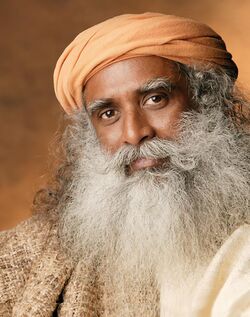
Location: Mysore, Mysore State, India




